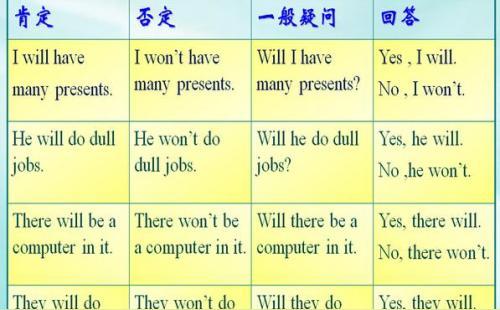一、一般将来时的句型结构?
一般将来时态比较常见的有两种表达方式,be going to加动词原形和will加动词原形。
如: I am going to visit Shanghai this winter holiday.
I will visit Shanghai this winter holiday.
这两种结构通常是可以互相改写的,但是它们还是有区别的。be going to更强调主观意识,而will更强调客观。
二、一般将来时的结构公式和例句?
一般将来时基本句型:
肯定句:第一人称 shall/will go. 第二三人称 Will go.
否定句:第一人称 shall/will not go. 第二三人称 Will not go.
一般疑问句:Shall 第一人称 go? Will 第二三人称 go?
简略回答:(肯)Yes,主语 shall/will (否) No,主语 shall/will not
特殊疑问句:一般将来时的特殊疑问句是将疑问词放在句首,后接一般疑问句(就主语提问时,以疑问词who开头的疑问词除外)
一般将来时结构
1、will / shall 动词原形:通常用于单纯地表示将来某个时间将要发生的动作或存在的状态。
eg. We will go to school tomorrow.
2、be going to 动词原形: 常用于美式英语,用来表示近期将要发生的动作或存在的状态,以及计划、安排、打算要做的事。
eg.There is going to be a football match this afternoon.
3、be +不定式表将来,按计划或正式安排将发生的事。
eg.We are to go to UK next week.
4、be about to +不定式,意为马上做某事,不能和表示明确时间的时间状语连用。
eg.He is about to leave for Beijing.
5、现在进行时表将来时,现在进行时和短暂性动词连用时可以表将来。
eg. go.come.fly.leave.start.begin.finish.end.arrive and so on.
My son is leaving tonight.
6、一般现在时表将来,和短暂性动词连用可以表将来计划或安排好的事。
eg.come, go, arrive, leave, start, begin, return and so on。
The football match begins at tomorrow evening.
以上就是一般将来时的六种常见句子结构了。
三、一般将来时8种结构例句?
①
一般将来时表示将来某个时间要发生的动作,事情或存在的状态,也表示将来经常或反复发生的动作或事情。那么,英语一般将来时的句子结构和语法特点是怎样的呢?下面为您讲解一下。
1、will/shall+动词原形 shall用于第一人称,常被will 所代替。will 在陈述句中用于各人称,在征求意见时常用于第二人称。will not=won't shall not=shan't例如:
Which paragraph shall I read first? 我先读哪一段呢?
Will you be at home at seven this evening? 今晚七点回家好吗?
2、 be going to +不定式,表示将来。
a. 主语的意图,即将做某事。例如:What are you going to do tomorrow? 明天打算作什么呢?
b. 计划,安排要发生的事。例如:The play is going to be produced next month。这出戏下月开播。
c. 有迹象要发生的事。例如:Look at the dark clouds, there is going to be a storm. 看那乌云,快要下雨了。
3、 be +不定式表将来,按计划或正式安排将发生的事。例如:
We are to discuss the report next Saturday.我们下星期六讨论这份报告。
4、 be about to +不定式,意为马上做某事。例如:
He is about to leave for Beijing. 他马上要去北京。
注意:be about to do 不能与tomorrow, next week 等表示明确将来时的时间状语连用。
Notice:be to和be going to
be to 表示客观安排或受人指示而做某事,be going to 表示主观的打算或计划。例如:
I am to play football tomorrow afternoon. 明天下午我去踢球。(客观安排)
I'm going to play football tomorrow afternoon. 明天下午我想去踢球。(主观安排)
5、现在进行时表将来时
下列动词的现在进行时表示将来时:go.come.fly.leave.start.begin.finish.end.arrive and so on.
she is leaving for Wuhan tomorrow.
6、一般现在时表将来
1、下列动词come, go, arrive, leave, start, begin, return的一般现在时可以表示将来,主要用来表示在时间上已确定或安排好的事情。例如:
The train leaves at six tomorrow morning. 火车明天上午六点开。
When does the bus star? It stars in ten minutes. 汽车什么时候开?十分钟后。
2、以here, there等开始的倒装句,表示动作正在进行。
②
2、be→was / were
肯:S.+ was∕were+…
否:S.+ wasn’t / weren’t +…
2、肯疑:Was∕Were + S. +…?
Yes, S.+ was∕were.
No, S.+ wasn’t∕weren’t.
3、否疑:Wasn’t∕Weren’t + S. +…?
Yes, S. + was∕were.
4、V. →V-ed
5、肯:S. + V-ed+…
6、否:S. + did not (didn’t )+ V原+…
7、肯疑:Did + S. + V原+…?
Yes, S.+ did.
No, S.+ didn’t.
8、否疑:Didn’t + S. + V原+…?

